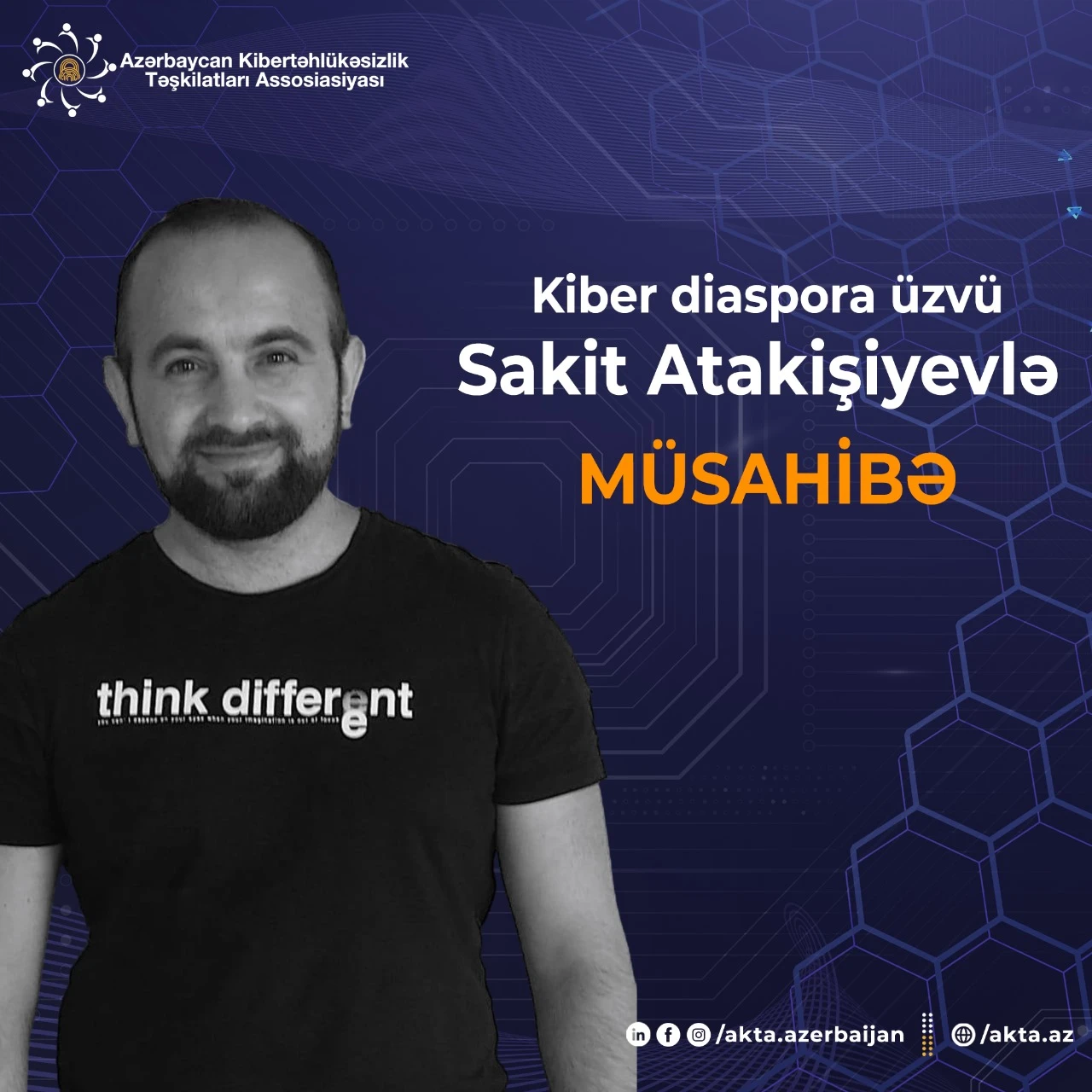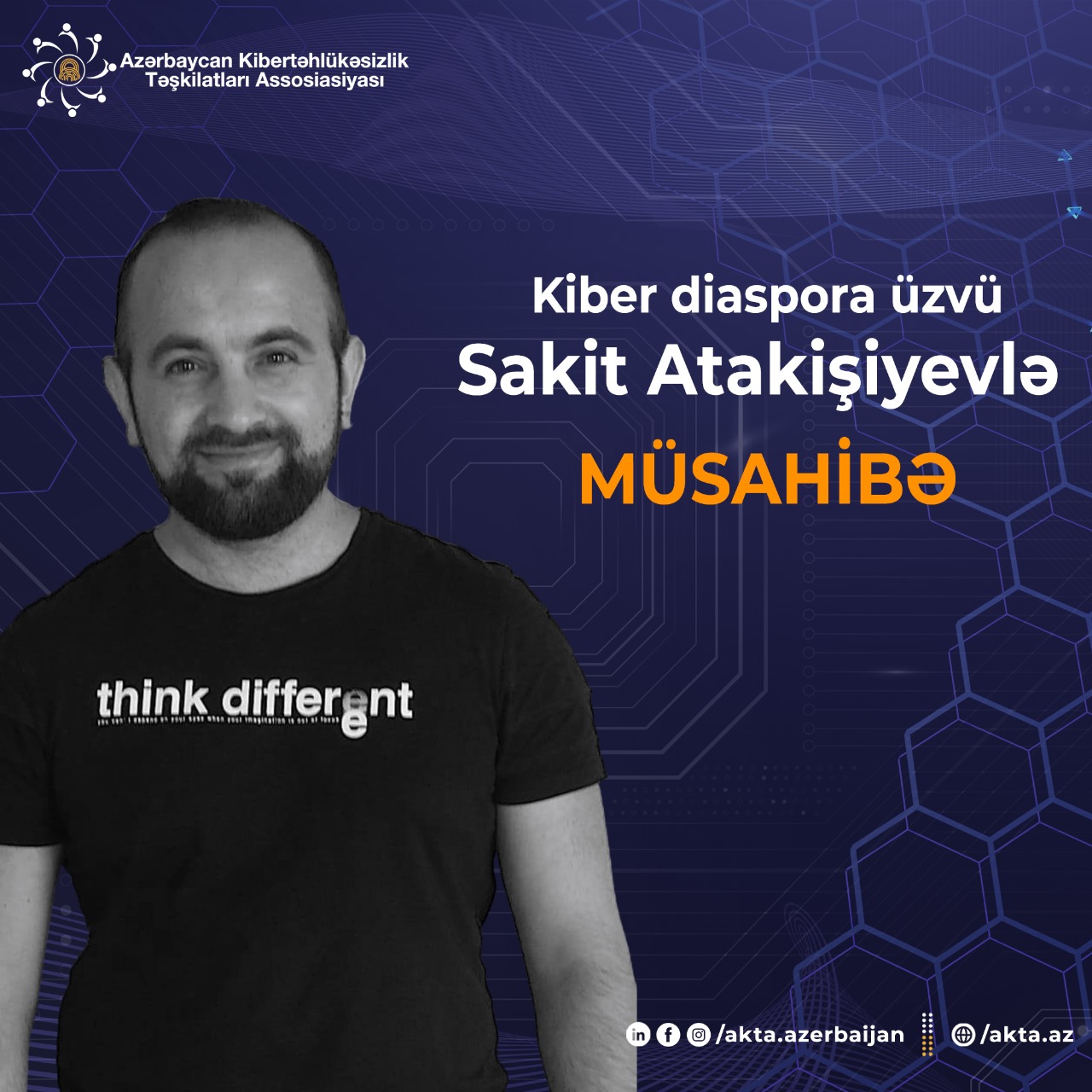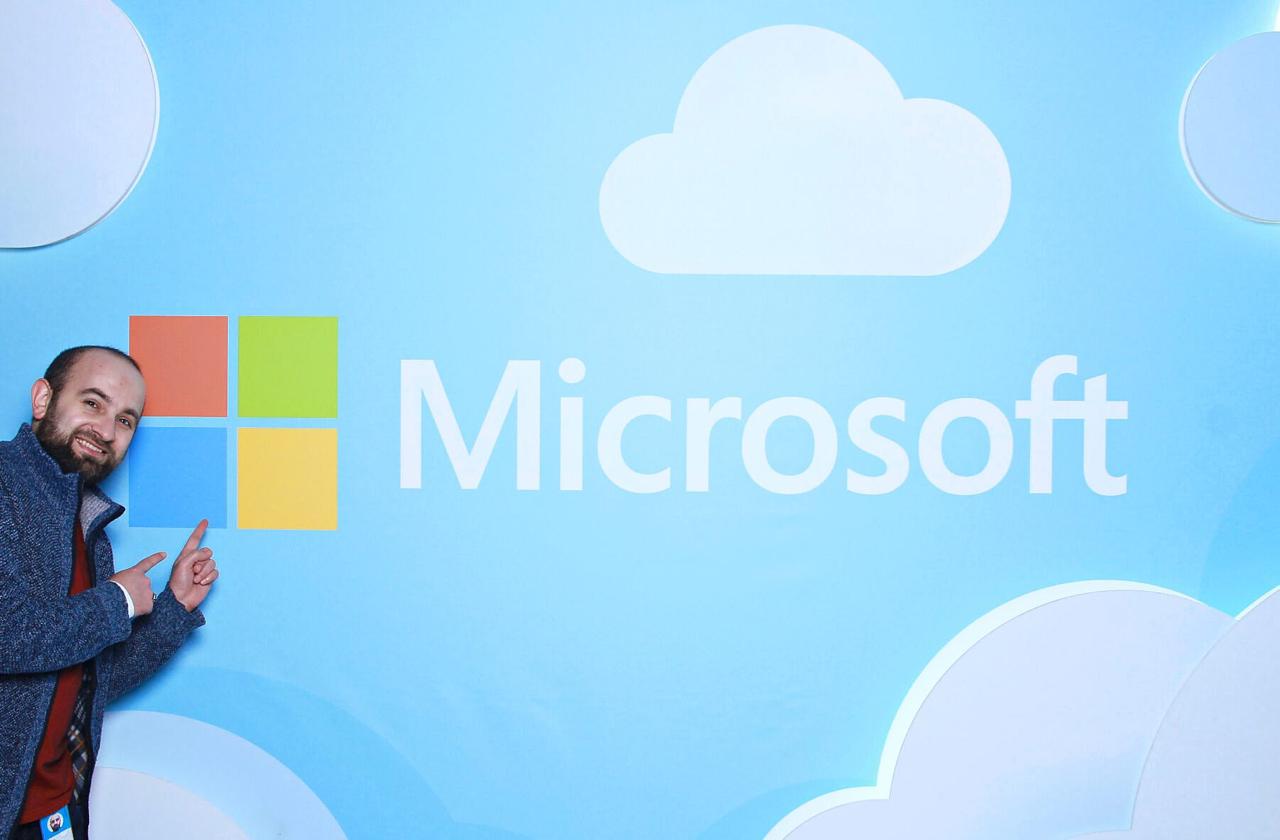
We present an interview with our fellow compatriot, Sakit Atakishiyev, a Software Engineer at Microsoft and a member of the Cyber Diaspora
03.02.2025

Good day!
Our interviewee, Sakit Atakishiyev, has been working as a software engineer since 2016. His journey in programming began in 2012 during his university years. During that period, he participated in internship programs at several companies in Northern Cyprus and Turkey. While studying at university, he represented his institution in the “IEEEXtreme-24” algorithm competitions organized by IEEE, where teams solve complex problems continuously for 24 hours. In 2013, his team secured third place among 38 universities in Turkey.
Until 2022, he primarily worked in Azerbaijan, occasionally taking on freelance roles in international projects. Since 2022, he has been working as a software engineer at Microsoft's Prague office.
1. Can you provide information about your career path in your field of expertise and work, as well as the key moments and reasons that have inspired you to continue this journey?
During the years I was preparing for university, mobile devices such as "Nokia" and "Siemens," which were considered the "smartphones" of that time, were already available. I was particularly drawn to this field back then—I wanted to learn the Java programming language and develop applications for mobile devices. However, I soon realized that knowing just one programming language was not enough. As I delved deeper into the sector, I discovered that developing software for any system, not just mobile applications, was far more intriguing. That is why, along with Java, I also studied operating systems, computer architectures, and processor functionalities in depth. Resources were limited at the time, and having a strong foundational knowledge was essential for making the most of the available tools. Over time, I understood that writing high-quality software with just a few lines of code was impossible without understanding how microprocessors and memory functioned. Only with this knowledge was it possible to develop high-performance applications with minimal resources and budget.
Between 2009 and 2011, I began studying Applied Mathematics and Cybernetics at Baku State University. Later, I decided to continue my education abroad to gain deeper knowledge in my field. Due to my strong academic performance, I was awarded a full scholarship to study Computer Engineering at Eastern Mediterranean University in Northern Cyprus.
Leaving my studies in Baku unfinished, I moved to Cyprus. I initially thought I would have to start over, but thanks to the academic credits I had earned at BSU, I was able to continue my education from where I had left off. Based on my two years of academic performance, I was exempted from the first two years of courses and completed my degree in three years. This period allowed me to focus on my core subjects and lay the foundation for my career. While studying, I participated in algorithm competitions and sought internship opportunities with companies in Cyprus and Turkey. During summer breaks, I joined paid internship programs at the companies that accepted me, gaining practical experience.
One of my first projects was developing a software program using genetic algorithms to generate my faculty's semester schedule. At that time, projects of this complexity were typically undertaken by master's students. However, with the guidance and support of my supervisor, Professor Ahmet Unver, I took on this challenging task as my thesis project and successfully delivered a fully functional system by the end of the semester. Normally, creating a semester schedule would take weeks, but with this software, it could be generated within just three to five minutes. This program is still occasionally used within the university today.
After graduating and completing my military service, I worked remotely on projects through Indian-based platforms for a while. In 2016, I started working as an Android developer at VITTA Scientific Technical Company, where I developed mobile applications for medical devices that could be used by patients themselves. These applications collected data such as blood pressure, weight, and blood sugar levels, shared it with the patient’s doctor, and created a medical history for the patient.
From 2016 to 2019, I also worked as a Java developer at Cybernet, where I experienced a turning point in my career. Although I was not very experienced at the time, Vusal Masiyev, the company's technical director, entrusted me with two critical projects. To meet his expectations, I worked diligently while simultaneously expanding my knowledge. Vusal Masiyev played a significant role in shaping my career. Despite making some serious mistakes during projects, he always approached them with understanding and helped me correct them. I take this opportunity to express my deep gratitude for his trust and the opportunities he provided for my growth.
Later, I was assigned to support a software project developed by a Turkish company. Shortly after its deployment, the software started crashing frequently. Despite their efforts, the company could not resolve the issue. Along with my teammates, we proposed rewriting the project from scratch. However, the client representatives viewed us as inexperienced and disregarded our suggestion. Nevertheless, within two weeks, our small team of five to six developers achieved what the original company had failed to do in three years. The project is still in use today.
In 2017, I developed a warehouse management system for a company operating in Baku and other regions. I handled every aspect of the project, from software development to database management and system administration. As the workload increased, I collaborated with another colleague. Later, when I moved to Prague, I completed the project and discontinued my activities in this direction.
In 2021, I decided to pursue opportunities at major tech companies. I spent three months preparing for job interviews during my free time. I applied for positions at Amazon and Facebook but could not achieve my desired results due to contracting COVID-19. Later, I interviewed with Google and Microsoft. While I was unsuccessful at Google, I received a job offer from Microsoft. Since 2022, I have been working at Microsoft's Prague office. During this time, I gained practical insights into the importance of security in large corporations—how even a minor mistake can lead to significant costs and issues, and how every byte of data matters. I consider this phase to be another major milestone in my career.
Starting in 2024, I have been working on an online course called "Data Structures and Algorithms" in Azerbaijani language with Adil Aliyev. This course is designed for beginners in programming and educators in the field. The content is now complete, and only a few technical details remain. We plan to finalize everything soon and offer the course for free on the "Özün Öyrən" portal.
I avoid routine tasks, which is why I have never been interested in the banking sector. I love learning new things every day and working in a dynamic environment. My biggest source of motivation is knowing that the software I develop helps people save time. Throughout my career, I have contributed to several projects that have significantly reduced manual labor—turning weeks of work into a few hours or transforming three-to-four-hour tasks into three-to-four-minute operations. Time is our most valuable asset, and it can never be recovered. Knowing that my work helps people save time, invest in self-improvement, prioritize their health, and spend more quality time with loved ones is the greatest motivation for me.
2. What are the main challenges you have faced while working in international companies? What steps have you taken to overcome these challenges?
One of the main challenges I have faced in teams is effective communication. I consider myself a demanding individual who strives for quick results. However, when working with people from different countries and cultures, this approach can sometimes lead to misunderstandings. Even the most neutral expression can be perceived differently and may result in misinterpretation. In my early years, this was one of the biggest difficulties I encountered. To overcome this, I focused on improving my communication skills, expressing my thoughts more carefully, and taking into account the psychology, culture, and values of the people I interact with. Over time, the impact of this challenge has significantly diminished.
Another difficulty is that, while a certain level of knowledge may be sufficient in smaller companies, the same approach is not always adequate in larger corporations. Whether it concerns libraries being used or code being written from scratch, it is crucial to understand every detail deeply. As a result, I make sure to thoroughly read documentation whenever I use a new library or write code. In some cases, I even review the source code of libraries to gain a deeper understanding. This approach enables me to master the tools I work with and develop high-quality, standards-compliant code.
Security is also a critical aspect of working in international companies. It is essential to understand the regulations of the countries where the company operates, such as GDPR (General Data Protection Regulation) and other data protection frameworks. Understanding where and how the software processes data is crucial—failure to do so can result in serious consequences for both the company and the individual. Therefore, I regularly participate in security seminars and mandatory training sessions. Given that security is an ever-evolving field, continuous learning and staying updated with the latest developments is a necessity.
3. What advice would you give to those looking to build a career in your field? What skills are essential to becoming a successful professional?
First and foremost, it is essential to enhance practical experience alongside technical knowledge. Acquired information should be deeply understood rather than relying on surface-level knowledge. Keeping up with innovations in the chosen field is one of the key factors for success. Additionally, developing analytical thinking and problem-solving skills through consistent practice and active engagement is crucial. Teamwork and communication skills are also fundamental for building a successful career.
Regularly discussing and sharing knowledge and experiences is an important step for career growth. To achieve success, one must first find their passion in the field. Hard work, perseverance, and a genuine love for the process are essential. When work is done with passion, overcoming challenges becomes easier, and new achievements become attainable.
4. What are your thoughts on the latest developments and trends in the field of cybersecurity? What opportunities exist for advancing Azerbaijan’s position and strengthening its standing in this sector?
The field of cybersecurity has become an unavoidable and strategically important area in our country. With the rapid development of technological innovations each day, the relevance of this sector continues to grow. For this reason, I believe that cybersecurity programs at universities should be taught in a more in-depth and systematic way, and special certification and scholarship programs should be supported to encourage young people to pursue this field. This would ensure the training of more qualified professionals for the labor market, while also creating a solid foundation for the development of a technological startup ecosystem. Strengthening cybersecurity infrastructure should not be limited to the education system alone; government institutions and the private sector should work together to establish national cybersecurity standards and effectively leverage international best practices and the expertise of advanced professionals.
To achieve this, establishing local and global partnerships, and participating in international conferences and forums, are essential steps for the protection and improvement of Azerbaijan's cyber environment. Given the country's geographic location and technological potential, organizing large-scale training sessions, seminars, and international events holds particular significance for positioning Azerbaijan as a cybersecurity hub in the region. These events allow local experts to access global experience, while also making Azerbaijan an attractive destination for foreign investors and technology companies. Moreover, attracting international certification centers to our country would be a significant advantage in aligning the knowledge and skills of young professionals with global standards.
It is also important to emphasize that the active participation of scientific research institutes and innovation centers at the national level not only drives the development of new technological solutions but also promotes the professional development of young specialists in the field.
Innovative projects that could emerge from research carried out at these centers would strengthen the competitive environment in the local market and accelerate Azerbaijan's integration into the global cybersecurity arena. I believe that the Association of Cybersecurity Organizations of Azerbaijan (ACOA) is one of the leading organizations in this field. I thank you for taking on this mission and look forward to seeing more successful projects in the future.

